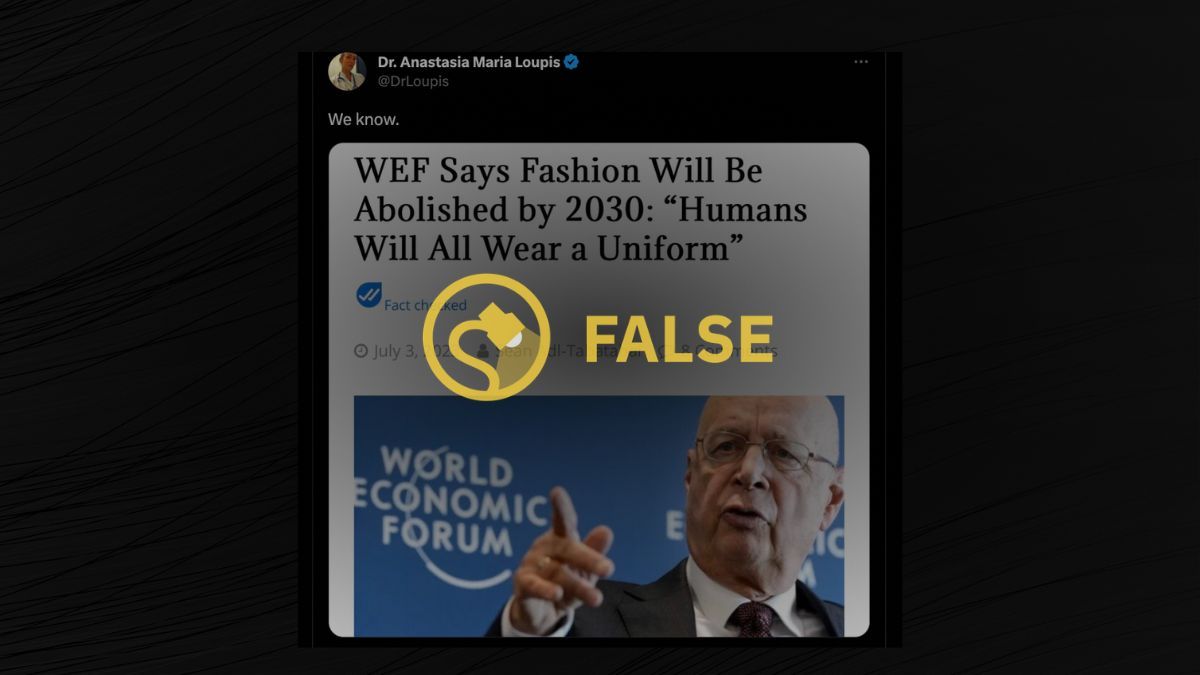On July 3, 2023, an article on The People's Voice, a self-proclaimed news website, claimed that the World Economic Forum (WEF) said fashion would be abolished by 2030 and "humans will all wear a uniform." The article asserted:
The World Economic Forum has declared that by 2030 fashion will become completely obsolete and all humans will be vegan, whether they like it or not.
A newly resurfaced report written in 2019 states that humans will only be permitted to buy three items of clothing per year and will be prohibited from buying or consuming meat.
The WEF — an influential international organization known for fostering private-public partnerships around the economy, international development, and more — is often the target of myriad conspiracy theories surrounding its real-life ties to elite networks that online rumor-mongers believe are nefariously planning to create totalitarian regimes. For the purpose of this fact check, we're focusing on the claim that the WEF said fashion will be abolished by 2030 and humans will all wear a uniform.
Are you ready for this? 🤨#WEF #KlausSchwab pic.twitter.com/2lPWO3eanv
— Wall Street Silver (@WallStreetSilv) July 6, 2023
That claim was false and a misleading interpretation of a real report released by Arup Group, a company that provides design, engineering, architecture, planning, and consulting services, in 2019. The report is titled "The Future of Urban Consumption in a 1.5°C World."
Firstly, the report was not tied to the WEF in any way; The organization neither funded the research nor participated in it under any capacity.
Instead, the report was "co-created and co-delivered by C40, Arup and University of Leeds with funding from Arup, University of Leeds and Citi Foundation," according to its credits. C40 is a network of 100 mayors from major cities around the world that aim to tackle the climate crisis, and the report focused on specific interventions within those cities that could help reduce carbon dioxide emissions.
The WEF's website does list the Arup Group as a "partner," saying the two parties have worked together on various initiatives in the past, including the "G20 Global Smart Cities Alliance on Technology Governance" that brought together various groups and governments to develop strategies on infrastructure, energy, and more. However, just because the Arup Group and WEF have a working history does not mean that the latter is involved in all projects by the former.
Arup describes itself as a "trust-owned" firm with "no individual shareholders or external investors." The company is owned by its employees — meaning it does not answer to any organization, much less the WEF.
Secondly, the report's authors did not state fashion will be abolished and humans will all be wearing uniforms by 2030. We downloaded a full copy of "The Future of Urban Consumption in a 1.5°C World" from Arup's website to examine its details.
The report looked at the impact of urban consumption on the climate crisis and explored possible changes to ensure that C40 member cities reduce their greenhouse gas emissions. It intended to serve as guidance for mayors of C40 cities who could use its suggestions however they saw fit — perhaps, by sharing its recommendations with national government leaders or citizens in the form of new policies or incentives. The report itself did not enact any policy changes nor regulations.
According to the report, C40 member cities represented 10% of global greenhouse gas emissions when accounting for consumption-based emissions.
The report looked at a number of categories that cities could target to reduce such emissions. Among them were clothing and textiles — or, the way people buy and use clothing and how manufacturers make such products. In that section, the report advocated for reducing the number of new clothing items that residents buy every year and decreasing supply-chain waste. The report stated:
The clothing and textile industry plays a significant part in the global economy. The industry is undergoing a transformation as growth rates are increasingly driven by expanding markets in rapidly developing nations. Emissions from clothing and textiles made up 4% of C40 cities' consumption-based emissions in 2017.
On page 82 of the report, a study stated that, if each person had only eight new items of clothing per year by 2030, and, if by 2050 each person had only three new items of clothing per year, then overall emissions from clothing and textile industries would go down significantly. Furthermore, that cut would be sharper, the study said, if there was a 50% reduction in supply-chain waste by 2030, followed by a 75% reduction by 2050.
In other words, while the report recommended people decrease their amount of new clothing purchases annually as part of a multi-pronged strategy to reduce carbon emissions, it did not declare universal uniforms, nor the end of fashion. Furthermore, the report was not funded by the WEF, nor did the organization have any role in its creation. We thus rate this claim as "False."

